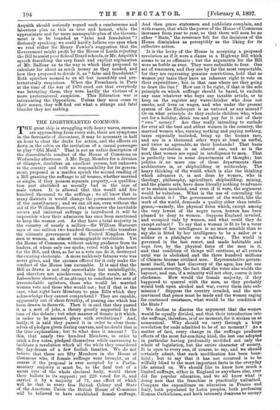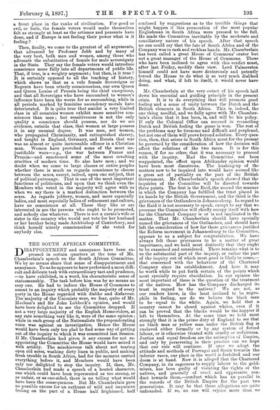THE LIGHTHEARTED COMMONS. THE great ship is struggling with heavy
waves, enemies are approaching from every side, there are symptoms in the forecastle of discontent, it may be necessary in half an hour to clear the decks for action, and the officers sit down in the cabin on the invitation of a casual passenger to play " Old Maid." That is not an unfair description of the discreditable conduct of the House of Commons on Wednesday afternoon. A Mr. Begg, Member for a division of Glasgow, doubtless an excellent person, but unknown to the country and with no responsibility for its govern- ment, proposed in a maiden speech the second reading of a Bill granting the suffrage to all women, whether married or single, if they possess separate property,—a qualifica- tion just abolished as morally bad in the case of male voters. It is allowed that this would add five hundred thousand to the suffrage ; we all know that in many districts it would change the permanent character of the constituency ; and we can all see, even without the aid of Sir William Harcourt, that whenever the inevitable occurs and universal suffrage is introduced it will be impossible when their admission has once been sanctioned to keep the women out. As they have a total majority in the country of nearly a million—Sir William Harcourt says of one million two hundred thousand—this transfers the ultimate government of the United Kingdom from men to women, an almost unimaginable revolution. 'Yet the House of Commons, without asking guidance from its leaders, of whom only one spoke, voted with a light heart for the Bill, and thus, as far as a vote can do it, destroyed the existing electorate. A more recklessly fatuous vote was never given, and the excuses offered for it only make the conduct of the House less excusable. It is said that the Bill as drawn is not only unworkable but unintelligible, and therefore not mischievous, being the result, as Mr. La.bmichere showed, of an attempt to conciliate two sets of irreconcilable agitators, those who would let married women vote and those who would not ; but if that is the case, what right have Members to pass Bills which they acknowledge they cannot comprehend ? They are capable, apparently out of sheer frivolity, of passing one which has been drawn in Sanscrit. Then it is said that they passed it as a sort of joke, a theory greatly supported by the tone of the debate ; but what manner of Senate is it which, in order to be amused, plays with revolutions ? And, lastly, it is said they passed it in order to clear them- selves of pledges given during canvass, and no doubt that is the true explanation ; but to what does it amount ? To this, that nearly two hundred Members, in order to catch a few votes, pledged themselves while canvassing to facilitate a revolution which all the while they considered the day-dream of a few foolish fanatics. We do not believe that there are fifty Members in the House of Commons who, if female suffrage were brought, as of course if the proposal is ever accepted by a Parlia- mentary majority it must be, to the final test of a secret vote of the whole electoral body, would throw their ballots in its support; yet 228 voted for it, and carried it by a majority of 71, one effect of which will be that in every free British Colony and State of the American Union the British House of Commons will be believed to have established female suffrage. And then grave statesmen and publicists complain, and with reason, that while the power of the House of Commons increases from year to year, so that there will soon be no other " State," the reverence felt for the decisions of the House diminishes as perceptibly as the liking for its collective action.
It is the levity of the House in accepting a proposed revolution as if it were a clause in a Highway Bill which seems to us so offensive ; but the arguments for the Bill were as feeble as ever. They were reducible to four. One set of reasoners, and they are by far the most respectable, for they are expressing genuine convictions, hold that as women pay taxes they have an inherent right to vote on their expenditure; but in that case where are they going to draw the line ? How can it be right, if that is the sole principle on which suffrage should be based, to exclude any man whatever who buys any taxable article, or to keep on the register any water-drinker who does not smoke, and lives on wages, and who under the present system of the Exchequer is as untaxed as any nomad? Or on what principle do they exclude children who, when out for a holiday, drink tea and pay for it out of their " own " money ? Are they really intending to exclude for ever all the best and ablest women in the country, the married women who, earning nothing and paying nothing, taxes especially included, bring up the human race, and are in a thousand other ways at least as useful, and twice as agreeable, as their husbands ? That basis for the revolution is an absurd one, and so is the next, that women are equal in intelligence to men. That is perfectly true in some departments of thought; but politics is no more one of those departments than architecture is, or shipbuilding or soldiership. The heavy thinking of the world, which is also the thinking which advances it, is not done by women, who in theology, philosophy, agriculture, shipbuilding, mining, and the plastic arts, have done literally nothing to advance or to sustain mankind, and even if it were, the argument would be valueless. What is the use of concealing the truth about it ? The government of the world, like the work of the world, demands a quality other than intelli- gence,—namely, the physical force which, except among the very lowest of the negro races, heaven has been pleased to deny to women. Suppose England invaded, and occupied only by women, and what could they do except submit ? To say that a woman is fit to be a voter by reason of her intelligence is no more sensible than to say she is fitted by her intelligence to be a sailor or a soldier or a platelayer on a railway. The world is governed in the last resort, and made habitable and kept free, by the physical force of the men in it, and that condition of things will continue, at all events until war is abolished and the three hundred millions of Chinese become civilised men. Representative govern- ment itself, that last discovery of the ages, has but one permanent security, the fact that the voter also wields the bayonet, and can, if a minority will not obey, coerce it into obedience. How would the female majority, if they happened to quarrel with the men, as they probably would both upon alcohol and war, coerce them into sub- mission ? Suppose the country invaded, and the men convinced that peace must be made and the women raging for continued resistance, what would be the condition of the State ?
We decline to discuss the argument that the women would be equally divided, and that their introduction into the suffrage, therefore, is of no moment, for it strikes us as nonsensical. Why should we carry through a huge revolution for ends admitted to be of no moment ? As a matter of fact, every change in the suffrage produces effects of the most far-reaching kind, the last one adopted in particular having profoundly modified not only the whole of legislation, but the entire character of society. It is open to every one, of course, to say, and we should certainly admit, that such modification has been bene- ficial ; but to say that it has not occurred is to be wilfully blind to the most important facts in the everyday life around us. We should like to know how much a limited suffrage, either in England or anywhere else, ever did for popular education, and we all know what is doing now that the franchise is practically unlimited. Compare the expenditure on education in France and Italy, both populated by Latin peoples, both professing Roman Catholicism, and both intensely desirous to occupy a front place in the ranks of civilisation. For good or evil, or both, the female voters would make themselves felt as strongly at least as the artisans and peasants have done, and if Europe is not feeling their power what is it feeling ?
Then, finally, we come to the greatest of all arguments, that advanced by Professor Jebb and by many of the very best, both men and women, among those who advocate the substitution of female for male sovereignty in the State. They say the female voters would introduce conscience more fully into all departments of public life. That, if true, is a weighty argument ; but then, is it true ? It is certainly opposed to all the teaching of history, which shows us that as a rule female Sovereigns or Regents have been utterly conscienceless, our own Queen and Queen Louise of Prussia being the chief exceptions, and that all Sovereigns who have succumbed to women's influence have been the worse for so succumbing, while in all periods marked by feminine ascendency morals have deteriorated. It is quite true that amidst a very limited class in all countries women exhibit more sensitive con- sciences than men ; but sensitiveness is not the only quality a conscience should possess, nor do we see evidence, outside that class, that women at large possess it in any unusual degree. It was men, not women, who propagated Christianity, and extinguished slavery, and taught in. England, Germany, and Russia that war was an almost or quite inexcusable offence is a Christian man. Women have provoked some of the most un- justifiable wars—e.g., the war between France and Prussia—and sanctioned some of the most revolting cruelties of modern time. So also have men ; and we doubt when we come to large classes or entire peoples whether there is much as regards conscience to choose between the sexes, except, indeed, upon one subject, that of political patronage. That is one of the most important functions of politicians, and upon that we think even the Members who voted in the majority will agree with us when we say there is a marked distinction between the sexes. As regards jobbery, women, and more especially ladies, and most especially ladies of refinement and culture, have no consciences at all. Those they like or are interested in are the persons who ought to be promoted, and nobody else whatever. There is not a curate's wife or sister in the country who would not vote for her husband or her brother being made Archbishop of Canterbury, and think herself utterly conscienceless if she voted for anybody else.







































 Previous page
Previous page